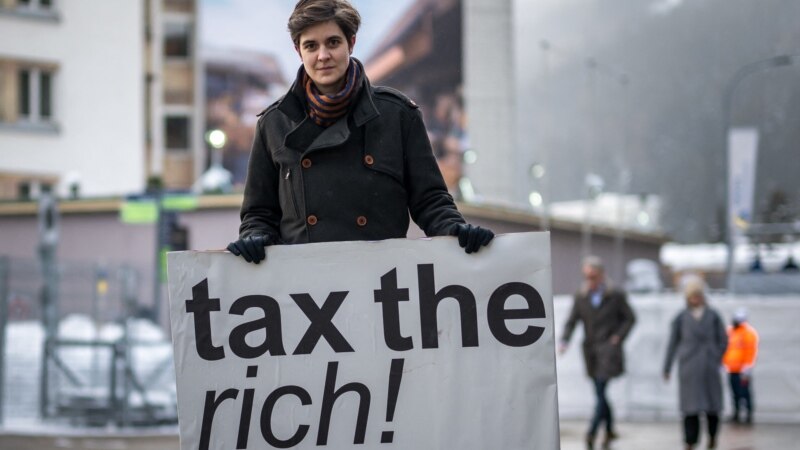
The rich and famous are paying top dollar for a place at this week’s Davos summit, but heiress Marlene Engelhorn is on the other side of the fence at the glitzy Swiss resort, demanding that they pay more in taxes.
The 31-year-old is also pursuing an ambitious plan to pay people to come up with ideas for her to give away the bulk of her $27.4 million wealth so she can escape what she calls a “dynastic rich swamp.”
“I’ve inherited a fortune and therefore power, without having done anything for it. And the state doesn’t even want taxes on it,” said the Austrian-German activist and founder of the Taxmenow initiative.
Engelhorn is joining several protests by a wealthy minority on the sidelines of the World Economic Forum calling for higher taxes on the rich.
The descendant of the founder of BASF chemical giant, Friedrich Engelhorn, is among an exclusive group of millionaires pushing for governments to tax them more to bridge the growing wealth gap.
The estimated 2,150 billionaires around the world are $3.3 trillion richer than they were in 2020, while nearly 5 billion people worldwide have grown poorer, the charity Oxfam said in a report on Monday, slamming “levels of obscene inequality.”
Engelhorn, who inherited millions when her grandmother died in 2022, announced this month that a citizens group of 50 Austrians will be set up and paid to devise ideas for the future of her fortune.
To make the process more democratic, 10,000 randomly selected Austrians are being invited to apply to join the group by filling out a questionnaire. Fifty will then be selected.
From March to June, the group will gather on several weekends in Salzburg to develop solutions “in the interests of society as a whole,” according to a statement.
Engelhorn was not immediately available to comment on the project.
If the group does not manage to suggest ideas with broad support, the inheritance will be returned to the heiress.
Engelhorn, who studied German at university, said she will get a regular job after “more than 90 percent” of her wealth has been redistributed.
“I’ll switch from the wealthiest 1% of society to the less wealthy 99%. … I think that’s an improvement. I’m moving up into a democratic society, out of this dynastic rich swamp,” she told the German daily Tagesspiegel.
Europe’s wealth inequality is particularly pronounced in Austria, economist Emanuel List of Vienna’s University of Economics and Business told AFP.
Quoting European Central Bank estimates, he said “the top 5% own about 54% of Austria’s net wealth, while the entire bottom half of households only owns 4%, so basically nothing.”
At least 15 billion euros are inherited or passed on in Austria every year, and whether one receives an inheritance or not “plays a very big role” in moving up the net worth ladder, he added.
In Austria, where conservatives have held the economy ministry for decades, inheritance tax was scrapped in 2008, one of few EU countries to do so.
Compared with campaigns such as U.S. billionaire Warren Buffett’s pledge to donate 99% of his fortune to philanthropic causes, List says Engelhorn’s scientifically supported initiative is “innovative.”
Amid a persistent cost-of-living-crisis, Austria’s opposition Social Democrats last year made a new call for an inheritance tax to be revived.
The ruling conservative People’s Party firmly rejected the proposal.
Austria’s far-right Freedom Party, which leads in polls ahead of a general election this year, called the Social Democrats’ tax plans “an attack on families, entrepreneurs and all top performers.”
